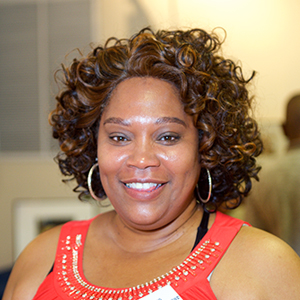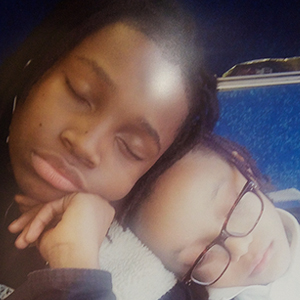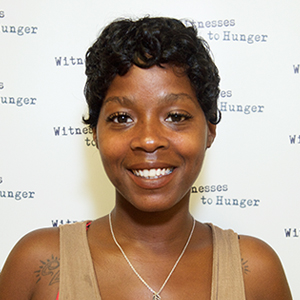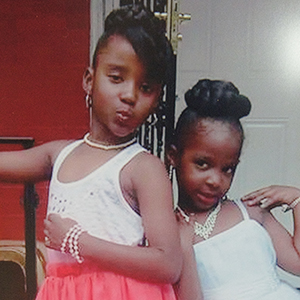Dr. Mariana Chilton didn’t expect her program to become a movement fueled by the women that it had attracted. As an anthropologist who works directly with people, she wanted to empower those who live with poverty to speak for themselves about their experiences.
“I wasn’t out there to save anyone or to do nutrition education, none of that,” says Chilton, director of the Center for Hunger-Free Communities at Drexel University’s Dornsife School of Public Health. “What I was interested in was to make sure people had a strong voice and a strong presence in the national dialogue. I was really disgusted that the people who were talking about hunger and poverty tended to be upper middle class and primarily white.”
In 2008, Chilton, a professor in the Department of Health Management and Policy, created the Witnesses to Hunger program so policymakers – and society in general – could see and hear those who had been pushed to the sidelines. Armed with digital cameras, more than 40 female Witnesses took photos of their everyday lives to show how they and their children lived. They also rode buses to Washington to testify at congressional hearings; talked to local, state and national officials; told their stories at events; conducted issue forums and exhibited their photos. The program has expanded to nine other sites, with the most active groups in Boston, Camden, Washington, DC, and New Haven, CT, along with Philadelphia.
After eight years, the women have seen positive changes in their lives and have moved beyond the place where they started. Chilton says she’s excited about their growth, and has hired a program director to help them and the program evolve.
“As soon as the women got together, they recognized they were the launch of a very cool and exciting movement,” she says. “As an academic, it certainly is not my expertise. That’s why I have been a little bit slow to start out with community organizing, but we’re starting to do that.”

"The program "gave me a voice. It gave me a sense of empowerment," Sutton says. "It gave me a sense of freedom and it gave me back my dignity..."
When Angela Sutton first met the women in Witnesses to Hunger, she felt that she had found a sanctuary. It was the same feeling she had experienced when she spent a year or so at a Job Corps center in the Poconos.
The mountains of Pennsylvania were a quiet and beautiful place, and the program’s natural setting and structure grounded her. In this new place, with these women, she felt an even stronger bond that helped erase her decades’-old feelings of being unloved and separate.
“When I came up, I had a lot of trials and tribulations,” says Sutton, 40. “I was by myself and didn’t have the support system that I needed. …I saw all these different women, all different shades, all different ethnic backgrounds and I wasn’t alone. It made me feel like, ‘Wow it’s not only me.’”
Sutton joined the program in its infancy after filling out a survey on food insecurity. She was later given a free digital camera and told to document her life as a woman living in poverty. Although struggling, she says, she is a woman with ambition and hopes, someone who has seen the darkest side of the human soul, and came out battered but stronger.
The program “gave me a voice. It gave me a sense of empowerment,” Sutton says. “It gave me a sense of freedom and it gave me back my dignity, letting people know that I am not lazy: I cook, I clean, I strategize, I budget.”
Sutton endured years of trauma to reach the point where she could be a spokeswoman for both herself and other poor women. She was born to a teenage single mother whom she believes never loved her – which completely destroyed her feeling of self-worth until she found forgiveness as an adult.
“I always felt like the black sheep. I always felt like outside the circle,” she says of her mother’s family of a husband and two children. It was in her godmother that she found solace. “I’m a firm believer that God put her in my life because he knew I was going to need a spiritual life to make it,” Sutton says. “She taught me about God. She was the first person who took me to church. She has given me light when there was no light. When my mom would yell at me or I felt alone I would sit in her kitchen while she was making cornbread.”
What she really wanted was to live with her father, whom she had never met. She pictured him as a kind and loving man with money who would come to rescue her.
She also went through some horrible traumas growing up: At age 8, she was raped by a teenage cousin. At age 14, she was caught in the crossfire of a shootout and was hit in the stomach, requiring 13 operations and leaving a scar on her belly.
When she left the hospital, she finally moved in with her father and his family, but the idyllic life she had imagined turned into a nightmare. For more than a year, she says, he repeatedly raped and beat her. He was finally brought up on charges more than a dozen years later, she says, but it was beyond the statute of limitations and he escaped major punishment.
During those years with her father, Sutton ran away often and attempted suicide. She never told her mother about the abuse, she says, believing that her mother should have been more attentive, especially the time when she called her begging to return home. At one point, she wanted to kill both her parents, she says.
Job Corps was the first turning point. “It was serenity, it was peace. It was like a safe haven where nobody could really hurt me. That part of my life I cherish.” After that year or so, she got jobs at fast-food restaurants, even selling Kirby vacuum cleaners door to door. She also started taking classes in behavioral health at Drexel University, she says, because she someday would like to open centers to help youths get past traumatic experiences, as she has. She has not completed her degree requirements yet.

JUST TRYING TO GET HOME SAFE
To get a good education, my sons have to take two buses and a train through the hood to get to school. They fight all day but here they were tired, cold, an supportingeach other just trying to get home safe.
Sutton and her family survive on a disability check, child support from her youngest son’s father, along with odd jobs she can find. She and her two sons - Jahzaire, 15, and Ayaan, 9 - live in a Section 8 townhouse that she got after the wife of a U.S. senator saw her Witness photos at an exhibit eight years ago.
For years, Sutton says, she blamed her mother for all the ugliness that had befallen her. Through Witnesses, she has learned to forgive both her mother and father.
“I had to come to grips that (forgiveness) wasn’t for them, it was for me,” she says. “It was for healing. I couldn’t heal. I couldn’t love. I forgave because I wanted to love my son (her first born) because I had a hatred towards men. … I had to come to grips that if we were not living in poverty and we had the health coverage to deal with mental illness, maybe my father would have gotten the help that he needed before he got to me.”
Dr. Mariana Chilton, who founded Witnesses, says Sutton –better known through her nickname Nike, for both the shoes she wanted but did not get as a child and the goddess of victory – has taught her much about trauma and forgiveness.
“I’ve brought her to Drexel multiple times to talk about her advocacy with Witnesses to Hunger,” says Chilton, “but also about the importance of forgiveness and reconciliation in order to have a personal experience of healing, and to be your best self and to have good relationships in the world.”
Whitney Henry: From a Dark Place to Bright Possibilities
 For much of her life, Whitney Henry had straddled the line between dignity and despair.
For much of her life, Whitney Henry had straddled the line between dignity and despair.
When she entered the Witnesses to Hunger program, she recalls, “I was in a darker place in my life. I was a new mom, I had just lost my best friend to domestic violence, I had just lost my baby brother to gun violence. I didn’t have the resources. I didn’t have the outlets, the things I have now. I definitely didn’t have the strength or courage.”
The program provided a digital camera to document her family’s everyday life “from the moment we woke up to the moment we went to sleep.” Today, she says, she barely recognizes herself in the earlier images of her life. That’s why the single photo she offered for a Witnesses exhibition last summer featured her two smiling daughters Zharae, 8, and Zuhrae, 5, – and the caption “My children are my reason for fighting.”
“I wanted people to see that Witnesses had overcome these things and we were in a better place in our lives,” says Henry, 29. “I seen myself as that ‘po’ black girl back then, but I seen a strong ‘po’ black girl,” she adds, using dialect for emphasis. “Like I tell my daughters and my sisters, there’s always a Harriet (Tubman) or Sojourner (Truth) in each generation and I felt like that was me.”
What she also found in the program was a group of women like herself, some in places far darker than hers, but all wanting to disentangle themselves from whatever was holding them back. They found sisterhood and camaraderie, and most became friends.
It was not the first time others had come into her life at the right moment.
As a preteen, her mother dropped her off at the Philadelphia Department of Human Services. Henry acknowledges that she was into some dangerous and naughty escapades: smoking marijuana starting at age 14, sneaking out of the house and hanging out with her friends. She ended up at the Meridian Group Home in the suburbs of Philadelphia, where counselors and staff changed her life. They pushed and encouraged her: She got good grades in school and made it into the 12th grade before her mother asked that she be returned, over Henry and the staff’s objections, she says.
Six months later, she was back on the streets, living with a girlfriend, working fast-food and retail jobs, selling and using drugs (marijuana only, she says). Later, while living with an aunt, she became pregnant with her first child.
In 2008, she met Dr. Mariana Chilton and joined the Witnesses to Hunger. “When I met her, she was bouncing from house to house, bouncing from job to job,” Chilton recalls. “I thought this woman ought to go to college and study poetry and do spoken word and have her own business because she’s so smart. But there she was at another job cleaning toilets, and I’m thinking what a waste of such incredible potential.”
The program gave Henry resources and access to government officials, but it also enhanced what she already knew and expanded her outlook.

MY REASON
My children are my reason for fighting.
“Yes, we all went without a meal,” she says. “Yes, we all had to scrape up something and had to deal with the welfare system and child care and working an hour over and getting our check cut off. This is why I always encourage everybody to use all this stuff as a stepping stone and not a permanent situation because how many times do you want to yell at somebody for not giving you free food? You have to look at the bigger picture these days.”
In June, Henry graduated with a high school diploma after almost a year of night school. Meanwhile, she’s working in housekeeping at a Marriott hotel and hoping for a supervisory position. Her ultimate goal is to open a nonprofit performing arts school for low-income children.
Beyond the Witnesses program, Henry has become a community activist, participating in protest marches against police brutality and black-on-black crime, helping to raise money to buy and transport water to Flint, MI, and organizing activities that celebrate mothers and provide school supplies for their children. She co-hosts a Teen Talk show on internet radio, started an online magazine called Proof when she was around 15 years old and writes continuously in her journal.
She laments that the Witnesses program is not as active in the community as she is. “I outgrew the program in a sense because I got tired of the talking part,” she says
“It’s more of a research program for them. … OK, that’s all fine and cool, but we are the experts. We got to go home and see this every day, so going to DC and talking to these people mean zero to me. ‘Cause me talking to them never made a difference. ‘Cause how I look at it, my ancestors been talking this same story for years and nothing has changed. So we have to change it within our people. That’s where I’m at with it.”
Chilton says she understands the frustrations. “What Witnesses has taught me over the years is that advocacy and informing the dialogue is not the answer,” she says. “I think that Witnesses hold the key."